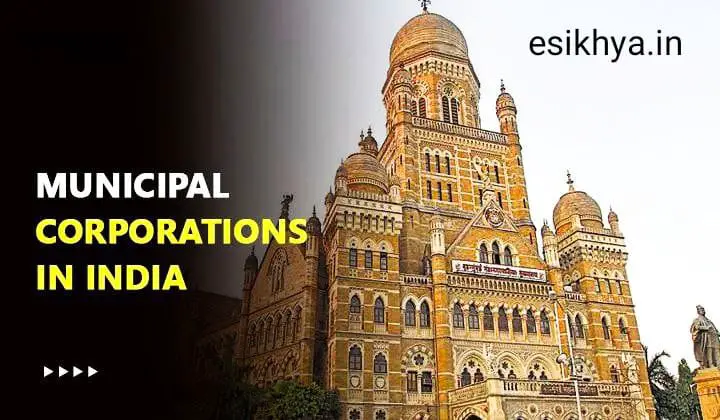
The Municipal Corporation is the highest urban local body in India, responsible for governing large cities and metropolitan areas. It is established under the framework of the Municipalities Act of the respective states and operates as an autonomous body with significant powers and responsibilities related to urban administration, development, and service delivery.
Composition of Municipal Corporation
The composition of a Municipal Corporation generally includes:
1. Members
- Corporators (Councillors): The Municipal Corporation is composed of elected representatives known as Corporators or Councillors. The number of Corporators is determined based on the population of the city and the provisions of state legislation. These members are elected by the residents of the city through municipal elections.
- Mayor: The Mayor is elected from among the Corporators and serves as the head of the Municipal Corporation. The Mayor presides over meetings, represents the corporation, and provides leadership in municipal governance.
- Deputy Mayor: The Deputy Mayor assists the Mayor and takes over in their absence.
2. Appointed Officials
- Municipal Commissioner: The Municipal Commissioner is a senior government officer appointed by the state government. The Commissioner is responsible for the day-to-day administration of the Municipal Corporation and acts as its Chief Executive Officer. They implement the policies and decisions of the corporation and manage municipal services.
- Additional Officials: Various other officials, such as Chief Engineers, Health Officers, and Finance Officers, are appointed to assist in specific areas of municipal administration.
3. Reserved Seats
- Scheduled Castes (SCs) and Scheduled Tribes (STs): Seats are reserved for SCs and STs in proportion to their population in the municipality.
- Women: At least one-third of the seats are reserved for women, including those from SCs and STs.
Powers and Functions of Municipal Corporation
The Municipal Corporation has a wide range of powers and functions aimed at managing and developing large urban areas. These include:
1. Developmental Functions
- Urban Planning: Develops and implements plans for urban development, including land use, zoning regulations, and infrastructure development.
- Infrastructure Development: Oversees the development and maintenance of urban infrastructure such as roads, bridges, public parks, and recreational facilities.
- Housing Projects: Manages housing schemes, including the development of affordable housing and slum rehabilitation programs.
2. Administrative Functions
- Local Administration: Handles the administration of municipal services, including sanitation, waste management, and public health.
- Public Utilities: Ensures the provision and maintenance of essential services such as water supply, electricity, and street lighting.
3. Regulatory Functions
- Market Regulation: Regulates local markets, commercial establishments, and public fairs within the city.
- Licensing and Permits: Issues licenses and permits for businesses, construction activities, and other regulated services.
4. Welfare Functions
- Social Welfare Programs: Implements social welfare programs aimed at improving the quality of life for residents, including health care, education, and poverty alleviation.
- Community Services: Provides community services such as public libraries, sports facilities, and cultural activities.
5. Financial Functions
- Budgeting and Fund Allocation: Prepares the annual budget for the city and allocates funds to various projects and services. The budget is subject to approval by the Municipal Corporation.
- Revenue Collection: Collects local taxes, fees, and other revenues, including property tax, water charges, and market fees. Ensures efficient management of municipal finances.
6. Coordination with State Government
- Implementation of State Policies: Acts as an intermediary for implementing state government policies and directives within the city.
- Reporting and Feedback: Provides feedback to the state government on local issues, the effectiveness of implemented policies, and the city’s development needs.
7. Legislative Powers
- Passing Resolutions and By-Laws: Can pass resolutions and by-laws related to urban governance, public health, and safety, subject to state government approval.
Significance of Municipal Corporation
The Municipal Corporation plays a crucial role in urban governance, especially in large cities and metropolitan areas. Its significance includes:
- Effective Urban Governance: Provides a structured mechanism for local self-governance, allowing residents to participate in decision-making and urban administration.
- Urban Development: Manages urban development and infrastructure, ensuring that services and facilities meet the needs of a growing and diverse population.
- Service Delivery: Ensures the effective delivery of essential services such as sanitation, water supply, and waste management, contributing to the overall quality of life in the city.
Challenges Faced by Municipal Corporation
The Municipal Corporation faces several challenges that can impact its effectiveness:
- Financial Constraints: Limited financial resources and dependence on state and central government grants can affect the ability to undertake and sustain development projects.
- Administrative Issues: Inefficiencies in administration, inadequate staffing, and lack of technical expertise can hinder the effective functioning of the corporation.
- Political Influence: Local political dynamics and interference can impact the impartiality and effectiveness of municipal governance.
- Coordination Problems: Coordination with state government agencies and other local bodies can sometimes be challenging, leading to overlapping efforts and inefficiencies.
Conclusion
The Municipal Corporation is a vital institution for urban governance in large cities and metropolitan areas. By managing development, public services, and regulatory functions, the Municipal Corporation helps ensure that urban areas are well-administered and that residents have access to essential services. Addressing challenges related to finance, administration, and coordination is crucial for enhancing the effectiveness and impact of the Municipal Corporation in promoting sustainable urban development.
